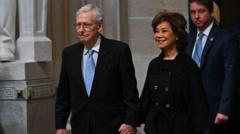The Palestinian leadership, along with various Arab nations and Western governments, have emphatically denounced President Trump's controversial suggestion to resolve the Gaza crisis by having the U.S. take control of the territory and relocate its inhabitants.
### Global Rejection of Trump's Gaza Takeover Proposal

### Global Rejection of Trump's Gaza Takeover Proposal
Reactions to Trump's proposal highlight deep international divisions on the Israeli-Palestinian conflict.
In the wake of a devastating conflict, Palestinian President Mahmoud Abbas firmly stated that the rights of the 2.1 million Palestinians living in Gaza will not be compromised, labeling the proposal as a breach of international law and asserting that Gaza is an essential component of the State of Palestine. Alongside Abbas, Hamas echoed similar sentiments, characterizing Trump's idea as exacerbating regional tensions.
Arab states, particularly Saudi Arabia and Egypt, reiterated their stance that any normalization of relations with Israel hinges on the establishment of a sovereign Palestinian state. Furthermore, they emphasized the urgency of reconstruction efforts in Gaza without displacing its residents. In contrast, Trump's proposal involves relocating around 1.8 million Palestinians and converting Gaza into a so-called “Riviera of the Middle East."
The proposal not only faced backlash from the Palestinian factions but also attracted criticism from multiple global perspectives. For instance, the foreign ministries of both France and the UK cautioned that Trump's plan would severely violate international laws and destabilize the region.
Despite Trump's insistence on the feasibility of relocating Palestinians with the cooperation of neighboring countries, citizens from Gaza firmly opposed the plan. Many expressed their determination to remain in their homeland, recounting the historical trauma associated with the 1948 Nakba, when large numbers were displaced.
In summary, Trump's strategy failed to find support amidst a backdrop of deep-seated issues related to Palestinian sovereignty and international law. The response from Arab states, Palestinian factions, and Western nations signals a complex landscape of relief efforts, calls for peace agreements, and attempts to uphold the rights of displaced populations in the region.
Arab states, particularly Saudi Arabia and Egypt, reiterated their stance that any normalization of relations with Israel hinges on the establishment of a sovereign Palestinian state. Furthermore, they emphasized the urgency of reconstruction efforts in Gaza without displacing its residents. In contrast, Trump's proposal involves relocating around 1.8 million Palestinians and converting Gaza into a so-called “Riviera of the Middle East."
The proposal not only faced backlash from the Palestinian factions but also attracted criticism from multiple global perspectives. For instance, the foreign ministries of both France and the UK cautioned that Trump's plan would severely violate international laws and destabilize the region.
Despite Trump's insistence on the feasibility of relocating Palestinians with the cooperation of neighboring countries, citizens from Gaza firmly opposed the plan. Many expressed their determination to remain in their homeland, recounting the historical trauma associated with the 1948 Nakba, when large numbers were displaced.
In summary, Trump's strategy failed to find support amidst a backdrop of deep-seated issues related to Palestinian sovereignty and international law. The response from Arab states, Palestinian factions, and Western nations signals a complex landscape of relief efforts, calls for peace agreements, and attempts to uphold the rights of displaced populations in the region.





















